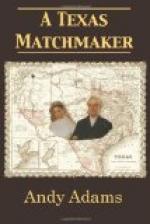On the conclusion of Scales’s experience, there was no lack of volunteers to take up the thread, though an unwritten law forbade interruptions. Our employer was among the group, and out of deference to our guest, the boys remained silent. Uncle Lance finally regaled us with an account of a fight between range stallions which he had once witnessed, and on its conclusion Theodore Quayle took his turn.
“The man I was working for once moved nearly a thousand head of mixed range stock, of which about three hundred were young mules, from the San Saba to the Concho River. It was a dry country and we were compelled to follow the McKavett and Fort Chadbourne trail. We had timed our drives so that we reached creeks once a day at least, sometimes oftener. It was the latter part of summer, and was unusually hot and drouthy. There was one drive of twenty-five miles ahead that the owner knew of without water, and we had planned this drive so as to reach it at noon, drive halfway, make a dry camp over night, and reach the pools by noon the next day. Imagine our chagrin on reaching the watering place to find the stream dry. We lost several hours riding up and down the arroyo in the hope of finding relief for the men, if not for the stock. It had been dusty for weeks. The cook had a little water in his keg, but only enough for drinking purposes. It was twenty miles yet to the Concho, and make it before night we must. Turning back was farther than going ahead, and the afternoon was fearfully hot. The heat waves looked like a sea of fire. The first part of the afternoon drive was a gradual ascent for fifteen miles, and then came a narrow plateau of a divide. As we reached this mesa, a sorrier-looking lot of men, horses, and mules can hardly be imagined. We had already traveled over forty miles without water for the stock, and five more lay between us and the coveted river.
“The heat was oppressive to the men, but the herd suffered most from the fine alkali dust which enveloped them. Their eyebrows and nostrils were whitened with this fine powder, while all colors merged into one. On reaching this divide, we could see the cotton-woods that outlined the stream ahead. Before we had fully crossed this watershed and begun the descent, the mules would trot along beside the riders in the lead, even permitting us to lay our hands on their backs. It was getting late in the day before the first friendly breeze of the afternoon blew softly in our faces. Then, Great Scott! what a change came over man and herd. The mules in front threw up their heads and broke into a grand chorus. Those that were strung out took up the refrain and trotted forward. The horses set up a rival concert in a higher key. They had scented the water five miles off.
“All hands except one man on each side now rode in the lead. Every once in a while, some enthusiastic mule would break through the line of horsemen, and would have to be brought back. Every time we came to an elevation where we could catch the breeze, the grand horse and mule concert would break out anew. At the last elevation between us and the water, several mules broke through, and before they could be brought back the whole herd had broken into a run which was impossible to check. We opened out then and let them go.




